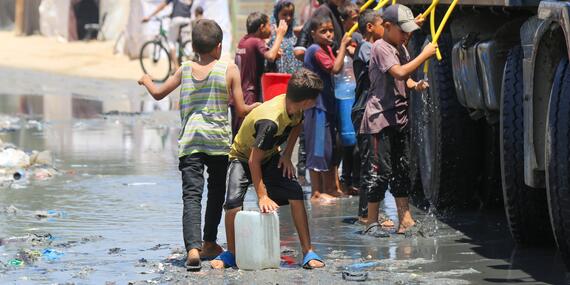Today's top news: Occupied Palestinian Territory, Central African Republic, Ukraine, Hurricane Beryl

Occupied Palestinian Territory
OCHA is deeply concerned over the ongoing spread of infectious diseases due to severe overcrowding of shelter spaces, dire shortages of clean water and abysmal sanitation and hygiene conditions in Gaza.
In a particularly worrying development, the World Health Organization reports that six environmental samples of variant poliovirus type 2 have been detected in Khan Younis and Deir al Balah. No paralytic cases have been detected.
As you know, polio can cause paralysis and death, especially among unvaccinated children.
WHO head Dr. Tedros Adhanom Ghebreyesus said in a social media post today that his agency – alongside UNICEF, Relief and Works Agency for Palestine Refugees in the Near East (UNRWA) and the Ministry of Health in Gaza – are carrying out a risk assessment to understand the scope of poliovirus spread and the necessary response to stop it – including through prompt vaccination campaigns.
He warned that the decimation of Gaza’s health system – as well as shortages of medical supplies, constant displacement of the population, weakened sanitation services, poor water quality, ongoing access obstructions, and a lack of security – are increasing the risk of vaccine-preventable diseases, including polio.
Other infectious diseases in Gaza are surging. As of 7 July, WHO says nearly 1 million cases of acute respiratory infections have been recorded since 7 October 2023. Nearly 575,000 cases of acute watery diarrhea and more than 100,000 cases of jaundice have also been documented. However, WHO says the real number of infections is likely far higher.
About 90 per cent of Gaza’s population has been displaced at least once since October of last year, with many living in appalling conditions.
An assessment last week by OCHA and humanitarian partners at two informal displacement sites and an UNRWA school found that most toilets there are not working due to damage and septic issues. This means sewage is spilling into the streets at some sites. The toilets that are available often have doors missing or cannot flush because there is no water to do so. Clean water is extremely scarce, leaving many families to drink highly saline water, which causes stomach pain.
OCHA reports that over the past week, aid organizations have seen a surge in displacement from northern to southern Gaza. As of yesterday, partners reported that more than 2,500 people had been displaced from northern Gaza to areas farther south in a single week. Aid workers provided those displaced with food, drinking water, hygiene supplies, and some shelter materials. Efforts are ongoing to provide additional assistance to vulnerable groups, including pregnant women, older people, and those with disabilities.
However, OCHA says ongoing hostilities continue to pose major risks to displaced people, as well as humanitarian workers.
Central African Republic
OCHA remains deeply concerned by the disastrous impact that ongoing hostilities in the Central African Republic are having on civilians.
One in five people in the country is displaced, either internally or in neighbouring countries, including Cameroon, Chad and the Democratic Republic of the Congo. Most of those who have fled their homes are women and children.
Meanwhile, the conflicts in neighbouring countries are further fueling humanitarian needs in the Central African Republic.
The UN Refugee Agency says the country has welcomed tens of thousands of people fleeing the fighting in Sudan since the conflict there began in April of last year, as well as intercommunal violence in Chad.
The humanitarian community in the Central African Republic is providing food and health assistance to the most vulnerable people, including in hard-to-reach areas.
However, OCHA and its partners continue to face significant challenges, including ongoing insecurity, access constraints and funding shortfalls.
More than halfway into the year, the Humanitarian Response Plan for the Central African Republic is less than a third funded, with US$119 million received of the $368 million required. We urgently appeal to donors to increase their support.
Ukraine
Active hostilities and insecurity continue to pose major risks and challenges for aid workers in Ukraine.
In new figures released this week, OCHA documented 19 such incidents during the months of May and June. During that period, 2 aid workers were killed – one in the line of duty. In 8 other incidents, a total of 12 humanitarian personnel were injured. Most of them were working in areas within 5 kilometres of the front line – underscoring the dangerous conditions aid workers face in trying to deliver critical assistance to civilians in need.
Since the beginning of the year, nearly a dozen cases of violence against humanitarian personnel in Ukraine have been reported, leading to more than two dozen casualties.
The main impediments to humanitarian access in eastern Ukraine have been the escalation of hostilities in the Donetsk region, the Russian Federation’s cross-border incursion into the Kharkiv region, and the high intensify of attacks along the Dnipro River in the Kherson region.
Meanwhile, humanitarian access to Russian-occupied areas of eastern Ukraine remains severely constrained.
Hurricane Beryl
OCHA and the UN Disaster Assessment and Coordination continue to support authorities and partners respond in the wake of Hurricane Beryl in Grenada, Saint Vincent and the Grenadines and Jamaica.
In Grenada and Saint Vincent, the teams are taking part in rapid assessments. We are also helping to deliver humanitarian supplies, restore power and health care services and supporting shelter management, among other activities.
At UN Headquarters in New York, OCHA chaired a Member State briefing this morning on the impact and response to the hurricane, where we heard from, among others, the Prime Minister of Saint Vincent and the Grenadines, as well as representatives of other affected governments, in addition to Simon Springett, the Resident Coordinator for Barbados and the Eastern Caribbean, and Elizabeth Riley, the Executive Director of the Caribbean Disaster Emergency Management Agency.
